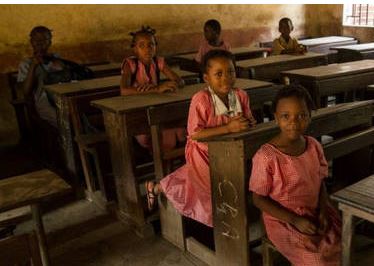
In attendance at the meeting were regional representatives of United Nations agencies, multilateral organizations and civil society, including Association for the Development of Education in Africa (ADEA), African Network Campaign on Education for All (ANCEFA), Conseil Africain et Malgache pour l'enseignement supérieur (CAMES), Council for the Development of Social Science Research in Africa (CODESRIA), Conférence des ministres de l’Education des Etats et gouvernements de la francophonie (CONFEMEN), Forum for African Women Educationalists (FAWE), Handicap International, IIEP-Pôle de Dakar, Réseau pour l’excellence de l’enseignement supérieur en Afrique de l’Ouest (REESAO), Save the Children, UNESCO-Dakar, UNESCO Headquarters in Paris, UNESCO Institute for Statistics (UIS), UNFPA, UNHCR, UNICEF, and World Bank. These organizations, active in supporting education development in West and Central African countries, met to agree on the composition of the Steering Team, the suggested topics for task teams, as well as the work plan for 2016-2017.
The members of the group began by sharing updates on their related activities since the second meeting held on 16 June 2016, with the welcome addition of input from the Global Partnership for Education (GPE).
The task team "Teaching and Learning: Educators' Network for Transformation (TALENT)", composed of ANCEFA, CONFEMEN, FAWE, Handicap International, REESAO, ERNWACA, UNESCO and UNICEF presented a review of activities carried on since June. This included a regional technical workshop, as part of the initiative for Measuring Early Learning and Quality Outcomes (MELQO) to promote SDG Target 4.2; the launch of an online platform to share information and experiences, as well as to ensure better visibility of the network; and an elaboration of the Terms of Reference for the inauguration of the TALENT task team, to be held in Dakar on October 26-28, in the framework of a regional workshop on professional standards for basic education teachers.
The work plan for 2016-2017 included the creation of task teams on (1) education policy, planning and monitoring, (2) girls’ right to education, as well as on (3) higher education and TVET. Moreover, the group agreed that UNICEF, CONFEMEN, CAMES and UNESCO would be part of the Steering Team while further discussions are needed on additional members.
The importance of the inclusive and diverse nature of the group was appreciated, with high hopes for their role as an intermediary voice between global and national efforts to advance towards the SDG4-Education 2030 targets.
CONTACTS
Gwang-Chol Chang Senior Programme Specialist, Chief of Education Section, UNESCO Dakar
Lily Neyestani-Hailu Programme Specialist in Educational Planning
